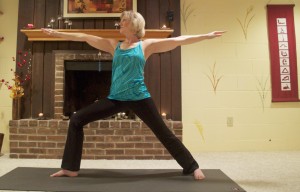
She saw three doctors and tried treatments that weren’t FDA-approved before finding the help she needed for her hot flashes and uncontrolled bleeding.
“Now I’m managing my symptoms in a safe way,” Karsen said. “Unfortunately, the treatments I used before were actually harming me.”
The hallmark signals of menopause include hot flashes, night sweats, vaginal dryness, low sex drive, mood disorders like anxiety or depression, weight gain, sleep disturbances and general fatigue.
“There’s no need for women to suffer from menopause, even if they’ve been blindsided by it,” said Diana Bitner, MD. A certified menopause practitioner, Dr. Bitner writes a blog, Midlife & Menopause Moments and is the author of I Want to Age Like That – Healthy Aging Through Midlife and Menopause.
The average age for menopause, often called the change of life, is about 52. Under normal circumstances, most women go through this transition at the same age as their mothers. For some women, however, menopause hits early because of cancer treatments or surgery to remove ovaries.
“Induced menopause is sudden, which makes it much more dramatic and severe,” Dr. Bitner said. “For young women with cancer, this can change their entire view of the world. Not only are they worried about fertility, they’re also worried about survival and dealing with the side effects of cancer treatments including hair loss, nausea and weight changes. Their bodies feel out of control.”
There are answers.
“I have a big tool bag and lots of tricks up my sleeve,” Dr. Bitner said.
The first step is making modifications to your lifestyle. They include:
- Hydration. Drink eight, 10-ounce services of water each day. If you drink caffeine or alcohol, don’t count them into the total. Instead, drink extra water to make up for them because they’re dehydrating.
- Sleep. Aim for 49 hours of sleep a week, even if it’s not evenly divided into seven hours per night. Studies show you can make up for lost sleep by going to bed a few minutes earlier and sticking to a routine.
- Exercise. For best results, combine aerobic exercise with stretching and strength training. Dr. Bitner recommends yoga to maintain muscle tone. Patients with cancer can increase their physical activities gradually as they’re able to tolerate it.
- Micronutrients. Take a multivitamin, vitamin D and calcium every day. Sure, it sounds good to get all of your nutrients out of food, but for most people that doesn’t work because we don’t eat enough fruits and veggies every day.
- Macronutrients. Focus on a diet that includes complex carbohydrates (such as brown rice, whole grains and quinoa), proteins and healthy fats. Avoid simple carbs like white potatoes, white rice or fiber bars, which are OK as an occasional treat, but not for daily consumption. And avoid too much sugar, which can actually lead to hot flashes.
- Fiber. Aim for 35 grams a day of insoluble fiber for a healthy colon.
- Gratitude and metered breathing. Every day, take a few minutes to be still and think of “thankful for” things. Also, be aware of your breathing.

“The mind/body connection is so important, and reducing stress is key to reducing menopause symptoms,” she said. “Yoga, tai chi, meditation, qi gong, and breathing have powerful positive physiological effects for menopausal women. Practicing metered breathing, positive affirmations, and feelings of gratitude bring you to a state of well-being and improve your quality of life.”
When needed, Dr. Bitner also encourages women to embrace the help available through medical science. She recommends FDA-approved hormone replacement therapy or non-hormone treatments for menopause symptoms.
For women who can safely use hormones, estrogen and progesterone may help, and sometimes testosterone. Local estrogen replacement can also be helpful for vaginal dryness. And gabapentin can help for hot flashes and night sweats.
Although women cannot use hormone replacement therapy while having chemotherapy, they may be eligible later if they’re doing well and had certain types of cancer.
The Food and Drug Administration has also approved anti-depressants to treat hot flashes, night sweats, mood swings and sleep problems as well as a woman’s sex drive.
“Every woman deserves a safe, personalized treatment approach,” Dr. Bitner said.
Women should also be aware of the long-term consequences of low estrogen, caused by menopause, which can lead to osteoporosis or heart disease. These are even more of a danger for women with induced menopause.
 /a>
/a>
 /a>
/a>
 /a>
/a>
This was very helpful. I will be having a discussion with my doctor soon.
Thanks Helen! Make sure to stop by Health Beat often for stories you may find of interest (we update several times each day)! 🙂